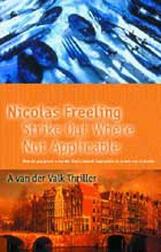
Strike Out Where Not Applicable
Nicolas Freeling
175 pages
published in 1967
Strike Out Where Not Applicable is a detective novel in the Van Der Valk series, which stars an Amsterdam police commissar, Piet Van Der Valk, who is properly cynical and worldweary. It apparently was very popular in the UK back in the seventies; there even were a couple of television series. Not that I heard from it until a few years ago; I'm not sure how popular these novels ever were in the Netherlands. Because despite the setting and Freeling's vagualy Dutch sounding name, these are not translations, but were originally written in English. I've never seen them in Dutch translation, but that doesn't mean they weren't.
This is the first book I read in the series and unfortunately it is somewhat atypical, as it is set after Van Der Valk has left the Amsterdam police for a new post in Lisse, a medium sized town in the provinces, as commissaire in charge of the criminal brigade: a desk job rather than a street job. This transfer was made after he was wounded in the course of duty, with the lingering effects of that wound rendering him unfit for duty in the Amsterdam police.
Van Der Valk adjusts well to this change, though he isn't entirely comfortable with it, becoming a respected member of the small town bourgeoisie of Lisse and actually enjoying it. His French wife Arlette certainly approves of the change and becomes a member of the local manége. It is here that the suspicious death takes place that's at the heart of the plot, when Bernard of the local posh inn The White Horse dies in what at first looks like a horse riding incident, but about which the doctor who investigates the accident has his doubts... The ensuing investigation takes Van Der Valk into the heart of the local "aristocracy", which is centered around the riding school.
Both the plot and its resolution only roughly resemble that of a conventional detective story. There is no neat solution to who killed Bernard, if he actually was killed, and you certainly get the suggestion that in the end Van Der Valk pinned the murder on a convenient subject without actually knowing or even much caring if that was the real murderer. That Van Der Valk engages in a spot of light torture to get a "confession" doesn't help. Actually, that was quite a shocking scene, as until that time he had behaved pretty much as any other respectable if cynical gentleman detective. It left somewhat frustrated and almost ruined the book for me, which sofar I had greatly enjoyed.
But the resolution, rickety though it is, fits the theme of the book, which is that you cannot render humans into neat categories of criminal or respectable member of the public, that crimes can be committed by the latter and which don't fit their behaviour otherwise, that some or even most crimes, even murders may not have a real solution like they have in detective novels. The problem is that for large parts of the novel this theme is submerged in another, somewhat more unconscious theme, that of life in an oldfashioned small provincial town in Holland, with all its boredom, pettyminded rivalries and jealousies. It's this theme that's much more alive in the novel, rather than the somewhat tedious and obvious one of "life is complex".
And it's this theme that I liked here, because Strike Out Where Not Applicable offers a window on a country that has now largely vanished, that of Holland from before "the sixties". I was born and raised in Zeeland, perhaps the most oldfashioned and backward province of the Netherlands, which still somewhat resembled the world Freeling described here: smallminded in some aspects, closed in, with limited options and a limited worldview and people liking this. Freeling gets it exactly right here.
The other thing I enjoyed about this novel is the way in which Freeling uses English dialogue to mimic the way Dutch people speak Dutch. The speech patterns, word order and even vocabulary all fit. The end result is an English that is slightly off: awkward, stilted, plain wrong in places, but that fits for people who are supposed to be talking Dutch. This is a great achievement and shows how good a writer Freeling was.
Read more about:
Nicolas Freeling,
Strike Out Where No Applicable,
crime fiction,
book review